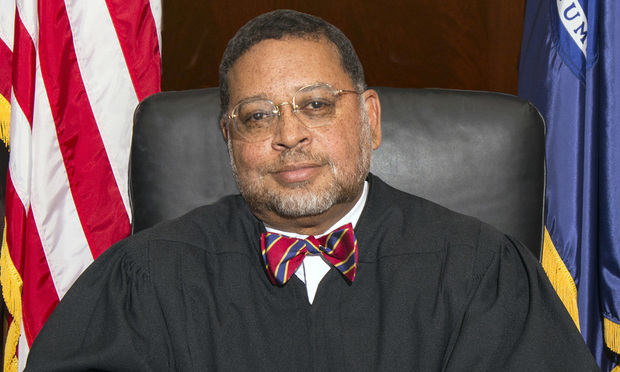New MSU Top Lawyer Robert Young's Priorities: Resolve Nassar Matters; Reform Legal Services
Corporate Counsel got Young to open up about why he has taken on the formidable challenge of running MSU's embattled legal department.
May 23, 2018 at 05:51 PM
7 minute read
 Robert P. Young Jr. Courtesy photo.
Robert P. Young Jr. Courtesy photo. The first time Michigan State University offered Robert Young Jr. the job of general counsel earlier this year, he turned it down. This week he changed his mind and accepted the post.
Young, 60, a former chief justice of the Michigan Supreme Court, is of counsel in the Lansing office of Dickinson Wright. Since mid-February, when the school's then-GC left under pressure from the Larry Nassar sexual abuse scandal, Young has been serving as special counsel to MSU.
In that role he oversaw the lawsuit negotiations that recently resulted in a $500 million tentative settlement for Nassar's victims, and continues to direct MSU's responses to multiple investigations.
Corporate Counsel spoke with the witty and affable Young on Wednesday about taking on the GC job beginning June 1. The conversation has been edited for clarity and length.
Corporate Counsel: Why take on this challenge now, at this point in your career?
Robert Young: Because I'm failing at retirement. And because having been special counsel, I became familiar with the university and have come to have some fondness for it. The reason for that budding affection is that my good friend [former Gov. John Engler, who appointed Young to the state Supreme Court in 1999] has become the interim president, and he asked me. I declined previously, but when Kristine Zayko [interim general counsel] also decided to depart, it left a large hole in the general counsel's office.
It seemed the need is one I could fill. And I have been a general counsel previously and understood the role, and I've had a lot of involvement already with the board. If you've ever been involved with a university, or even a large private school, you know there is always something happening that you have to attend to. It is not a boring portfolio. I thought I was well suited, and have something to offer.
And by the way, it's fun.
You left private practice once before in your career to become a general counsel at AAA Michigan for three years before joining the court; do you prefer being a general counsel to private practice?
Each one is different. It's like saying, which one of your children do you like more? I have enjoyed doing the very thing I was doing at the time.
[Since retiring from the court a year ago] I was having a very successful reintroduction into private practice. I was wondering if the world has changed so much that I wouldn't be as effective. But I had my first argument in 26 years before a federal court with a successful result. So people out there were beginning to respond.
I've always been blessed and able to do things and have fun in things I was doing. I didn't expect to reprise my role as general counsel, but it came into being.
What are your top priorities?
Resolving the Nassar matter with finality, mastery of the new role in a broader sense, and providing excellent legal service to the client. And making sure that the lawyers are happy and effective, and that the clients are happy, too.
What was your role in the lawsuit negotiations with Nassar's victims? Did you actually do the negotiating?
I led the negotiations. It was a team effort, really, with a very talented group of lawyers from Skadden [Skadden, Arps, Slate, Meagher & Flom], Miller Canfield [Miller, Canfield, Paddock and Stone] and Latham & Watkins. With the president's deep involvement, we set the priorities and directed the strategy. Somebody from the organization has to have an overarching vision of the mediation process, and that was me.
The university is still subject to a number of ongoing investigations; how involved are you in those, and will you continue your involvement?
Yes, I am directing the responses to those, and I'll continue to be involved until they are completed.
After you become general counsel, will you continue teaching your law class in pretrial advocacy?
Yes. I enjoy dealing with students, and I've done this since I was in private practice [the first time]. I was tutoring some Wayne State [University law] students in civil procedure, and realized what an abstract proposition it was for a student who didn't even know what an interrogatory was.
I decided to teach a course on how to operationalize civil procedure. It's highly interactive, with the class divided into plaintiffs and defendants on an employment matter. Every week they have a written assignment, such as writing an interrogatory or preparing a witness.
A lot of graduates have written me after a few years to say that it was the most valuable course they took in law school.
Some critics, such as the Nassar plaintiffs, have said you are not the right man for the job because your record shows you often rule against sex abuse victims. They think you can't lead the culture change that is needed at MSU right now. How do you feel about that?
What I understand the law to require as a judge, and what I have to do or need to do in this role are entirely different. In those [sexual abuse] cases the question was to what extent does the employer have vicarious liability for a criminal act. It is perfectly useful to talk about a particular act, like sexual misconduct, forgetting about [the fact that] there is whole range of criminal acts an employee can do, and that you must ask if the employer then is also vicariously liable for those acts.
To have that would require a lot of different behavior [from employers] that I don't think the law imposes. What sort of due diligence must you do on every employee? How prescient must an employer be? You [as a judge] have to think more broadly of the whole range of vicarious liability.
It is different from being a general counsel. My role as a judge does not foreshadow what my role as an advocate is.
The MSU legal department has lost two key leaders, each with 20 years' experience. How will you go about repairing a legal department that has been so damaged by loss and criticism?
First of all, I'm new. To the extent that my predecessors had baggage concerning how they did or didn't advise various units within the university, I don't have that baggage. I get a little bit of a break by being the new kid on the block.
Second, I have a very long record of reform. I reformed the general counsel function at AAA.
I had a 60 person in-house law firm with roughly 9,000 cases a year coming in, and we did about two-thirds of those; and I made significant reforms there. When I became chief justice, I made significant reforms [at the Supreme Court]. So I imagine as I see opportunities to improve how this office functions and provides service to clients, we'll make those changes.
Is there anything else you'd like to add about Michigan State or your new job?
No. I'm not a millennial, so I don't feel the need to overshare.
This content has been archived. It is available through our partners, LexisNexis® and Bloomberg Law.
To view this content, please continue to their sites.
Not a Lexis Subscriber?
Subscribe Now
Not a Bloomberg Law Subscriber?
Subscribe Now
NOT FOR REPRINT
© 2025 ALM Global, LLC, All Rights Reserved. Request academic re-use from www.copyright.com. All other uses, submit a request to [email protected]. For more information visit Asset & Logo Licensing.
You Might Like
View All
FTC Sues PepsiCo for Alleged Price Break to Big-Box Retailer, Incurs Holyoak's Wrath
5 minute read
Wells Fargo and Bank of America Agree to Pay Combined $60 Million to Settle SEC Probe

‘Extremely Disturbing’: AI Firms Face Class Action by ‘Taskers’ Exposed to Traumatic Content
5 minute read
MLB's Texas Rangers Search for a New GC and a Broadcasting Deal
Trending Stories
- 1Reviewing Judge Merchan's Unconditional Discharge
- 2With New Civil Jury Selection Rule, Litigants Should Carefully Weigh Waiver Risks
- 3Young Lawyers Become Old(er) Lawyers
- 4Caught In the In Between: A Legal Roadmap for the Sandwich Generation
- 5Top 10 Developments, Lessons, and Reminders of 2024
Who Got The Work
J. Brugh Lower of Gibbons has entered an appearance for industrial equipment supplier Devco Corporation in a pending trademark infringement lawsuit. The suit, accusing the defendant of selling knock-off Graco products, was filed Dec. 18 in New Jersey District Court by Rivkin Radler on behalf of Graco Inc. and Graco Minnesota. The case, assigned to U.S. District Judge Zahid N. Quraishi, is 3:24-cv-11294, Graco Inc. et al v. Devco Corporation.
Who Got The Work
Rebecca Maller-Stein and Kent A. Yalowitz of Arnold & Porter Kaye Scholer have entered their appearances for Hanaco Venture Capital and its executives, Lior Prosor and David Frankel, in a pending securities lawsuit. The action, filed on Dec. 24 in New York Southern District Court by Zell, Aron & Co. on behalf of Goldeneye Advisors, accuses the defendants of negligently and fraudulently managing the plaintiff's $1 million investment. The case, assigned to U.S. District Judge Vernon S. Broderick, is 1:24-cv-09918, Goldeneye Advisors, LLC v. Hanaco Venture Capital, Ltd. et al.
Who Got The Work
Attorneys from A&O Shearman has stepped in as defense counsel for Toronto-Dominion Bank and other defendants in a pending securities class action. The suit, filed Dec. 11 in New York Southern District Court by Bleichmar Fonti & Auld, accuses the defendants of concealing the bank's 'pervasive' deficiencies in regards to its compliance with the Bank Secrecy Act and the quality of its anti-money laundering controls. The case, assigned to U.S. District Judge Arun Subramanian, is 1:24-cv-09445, Gonzalez v. The Toronto-Dominion Bank et al.
Who Got The Work
Crown Castle International, a Pennsylvania company providing shared communications infrastructure, has turned to Luke D. Wolf of Gordon Rees Scully Mansukhani to fend off a pending breach-of-contract lawsuit. The court action, filed Nov. 25 in Michigan Eastern District Court by Hooper Hathaway PC on behalf of The Town Residences LLC, accuses Crown Castle of failing to transfer approximately $30,000 in utility payments from T-Mobile in breach of a roof-top lease and assignment agreement. The case, assigned to U.S. District Judge Susan K. Declercq, is 2:24-cv-13131, The Town Residences LLC v. T-Mobile US, Inc. et al.
Who Got The Work
Wilfred P. Coronato and Daniel M. Schwartz of McCarter & English have stepped in as defense counsel to Electrolux Home Products Inc. in a pending product liability lawsuit. The court action, filed Nov. 26 in New York Eastern District Court by Poulos Lopiccolo PC and Nagel Rice LLP on behalf of David Stern, alleges that the defendant's refrigerators’ drawers and shelving repeatedly break and fall apart within months after purchase. The case, assigned to U.S. District Judge Joan M. Azrack, is 2:24-cv-08204, Stern v. Electrolux Home Products, Inc.
Featured Firms
Law Offices of Gary Martin Hays & Associates, P.C.
(470) 294-1674
Law Offices of Mark E. Salomone
(857) 444-6468
Smith & Hassler
(713) 739-1250






